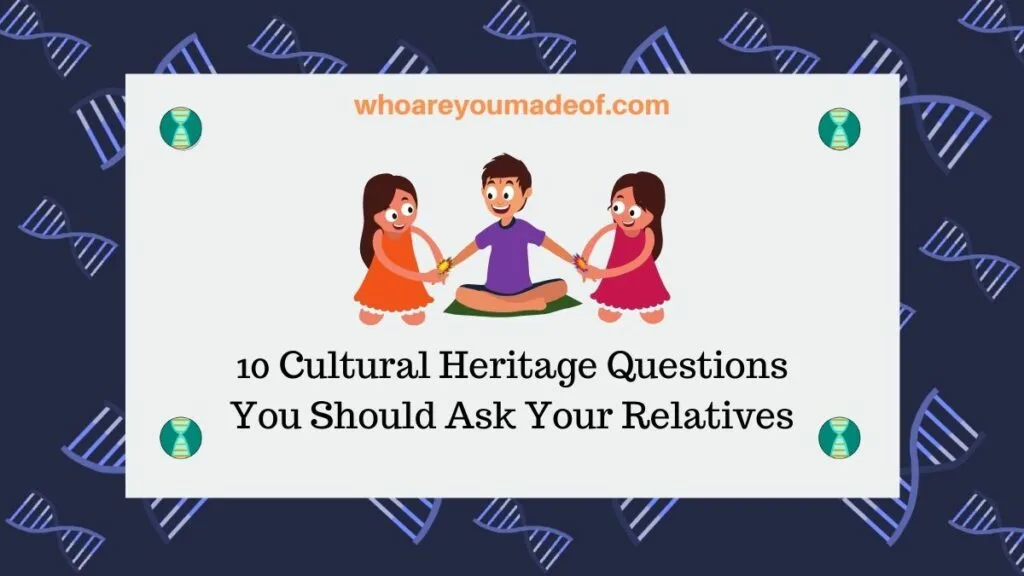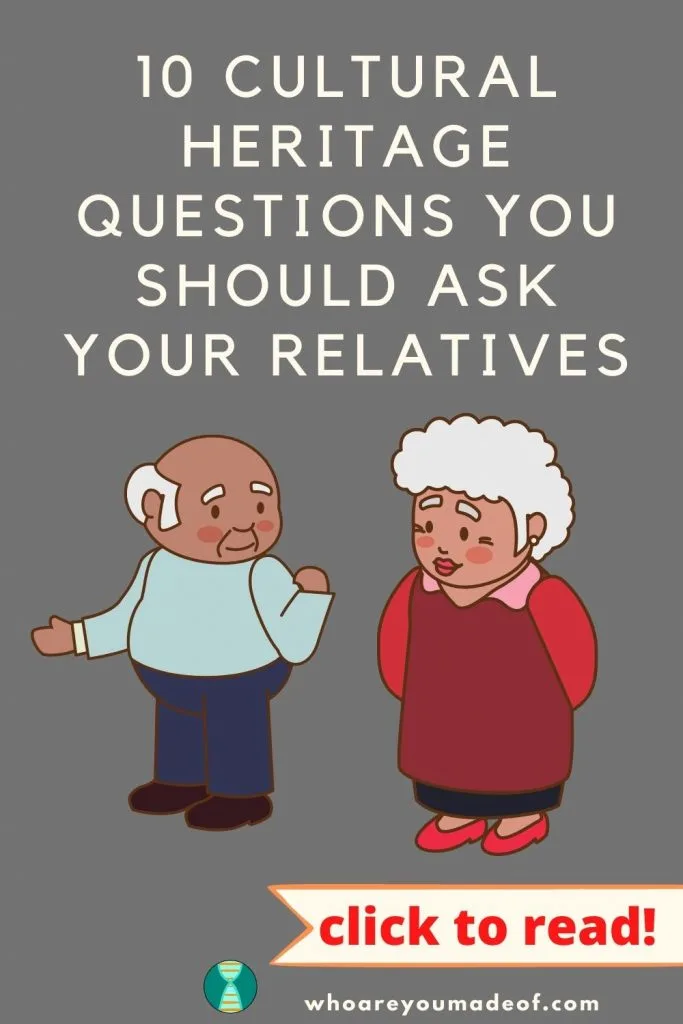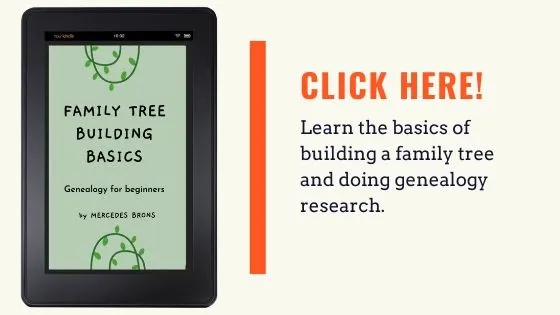Documenting your family's culture and history is important. In this post, learn 10 cultural heritage questions that you should be asking your relatives.
Many people don't really think of themselves or their family as having a particular culture. For most people, it's "just how things were done".

Every family has a culture that is based on their unique community and ancestry. We will all learn something new about the roots of the traditions that our family observes, and the answers to many questions might surprise us.
That's why asking the right questions is so important. We need to get our relatives to open up to us and share important information about their life experiences as a member of a particular cultural tradition.
Who should you ask cultural heritage questions?
Many people are under the mistaken impression they don't have anyone in their life that can help them document their family's cultural heritage. This is almost never the case, however, since almost any of our older relatives have a wealth of family knowledge.
Anyone in your family or community who is older than you can provide insight into your family and community's cultural history.
People to interview to learn about your cultural heritage:
- Grandparents
- Parents
- Aunts and uncles
- Great-aunts and uncles (siblings of your grandparents)
- Older first or second cousins
- Older siblings
- Older neighbors and friends
The cultural heritage questions below are great for students wanting to learn more about their family because of a project, but also for those of us who love to do family history research in order to document our unique cultural heritage for future generations.
10 of the most important cultural heritage questions to ask
Once you have decided who to interview, be sure to ask the questions listed below. These questions, along with the discussion that should naturally occur during your conversation with your relative, will help you thoroughly document your family's cultural history.
How would you describe your cultural identity or ethnicity?
This seems like a simple question, but it is important to ask your relative to describe the culture to which they belong in their own words. Many people have never thought about their culture as separate from the broader community, so it might take your relative a few minutes to think about this question.
Many of us consider ourselves to be a few generations removed from a unique culture, especially if we are the grandchildren or great-grandchildren of immigrants. Even if this is the case in your family, as it is in mine, your family may still have a cultural connection to these immigrant ancestors.
Sometimes, the answer to this question is different than you thought it would be.
Do you belong to a group of people that you consider to be different than others where you come from?
Many times sub-cultures exist within a larger cultural context. Finding out whether our family members were part of a unique sub-culture is important because this will help us better understand how our family interacted with the community.
What family traditions did you have growing up?
This is my favorite question, because it gives us the opportunity to learn something tangible about our ancestors that we can pass down to our own families.
Family traditions also provide insight into religion, history, and the society in which our family lived.
Did anyone in your family or community speak another language?
We usually know the name of a main language spoken in a particular location. Sometimes people who live there speak less commonly-known languages.
Ask your relatives which languages were spoken in their family and which languages were commonly spoken by other people in the community.
Describe the traditional way that people in your culture dress for regular and special occasions
While most places in the world now have a more homogenized "modern" style of dress, many communities still treasure the more traditional way that people in their culture dressed for different occasions.
Ask your relative to describe how they remember people dressing in their community for normal and special occasions.
What is a unique belief that people from your community have?
Almost everyone that I know has something that they grew up believing or that their parents believed. These beliefs are often a clue about our cultural history.
Beliefs about animals, the weather, health conditions, and other general topics are very common all over the world.
For example, my parents told me that if the wind changed while I was making a face (probably while crying), that my face would stay that way.
This is a common expression in the United States, and I don't know the origin. Expressions like this are often based on beliefs or superstitions.
What are the three most important things that people should know about your culture
Ask your relative if they could boil their culture down to three most important elements, what would they be?
It is interesting to know how your culture is perceived by different members of your family.
What do you consider to be traditional music where you are from?
For most cultures, music is an important and unique tradition. Ask your relative what they consider to be the traditional music in their culture.
They might be able to provide insight into the instruments that are used, and the type of music that is enjoyed for special occasions and daily entertainment.
What types of foods were cooked for special occasions when you were growing up?
This is my favorite, favorite question. Ask your relative why types of foods they ate, or were served, on special occasions during their childhood.
Special occasion foods are often an important detail that you can use to explore your culture further. Food traditions are often passed down for many generations in a family, even when other obvious cultural traditions have disappeared.
Where did people go when they traveled when you were younger?
Ask your relative where their family members or people from their community traveled to when they were growing up. This is just a unique question that will help you learn something interesting about your family's culture.
What to do with the information learned from the cultural heritage question
Be sure to take good notes while you are talking with your relatives, and keep your notes in a place where you will have access to them in the future. If your relative wouldn't mind, consider asking them if you can make an audio or video recording of the interview.
You can even upload this audio file to your Ancestry tree to preserve it for the future.
One of the things that I wish I had was a recording of my grandfather's voice while he told me stories about his family. I know that videos and audio recordings are treasured and can be preserved for years to come.
You might want to consider building a family tree and attaching notes to the members of your tree that you interviewed. This is helpful for sharing your research with future generations.
For tips on doing family tree research for beginners, consider getting my book, available softcover on Amazon or as an e-book download.

Conclusion
To learn more about how to do a cultural heritage interview and find more questions to ask, read this post:
If you have any questions about something that you read in this post, or if you would like to share your own suggestions for questions to ask your relatives, please join us in the discussion below.
Thanks for reading this post today 🙂



none of your busniess
Thursday 22nd of February 2024
this is the fucking dumbest wedsite ever!
none of your busniess
Thursday 22nd of February 2024
this was the worst thing ever I did not see the questions and whatever pictures that were trying to load did not even load!